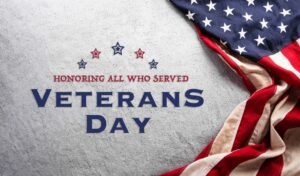Each year, on Veterans Day, nations worldwide pause at the 11th hour of the 11th day of the 11th month to honor the contributions and sacrifices of military veterans. This moment holds deep historical and emotional significance, marking the end of World War I and the beginning of a tradition that encourages collective reflection and gratitude. Understanding why we observe Veterans Day at this time involves exploring its historical roots, the evolution of its observance, and the continued importance of honoring veterans.
Despite its significance, many people may view Veterans Day simply as a day off from work. This perspective can arise from a lack of awareness about the day’s historical roots and purpose. Additionally, in the hustle of everyday life, the deeper meaning of such observances can be overshadowed by the allure of a long weekend or leisure activities, leading to a disconnect from the day’s intended purpose of reflection and gratitude.
The Historical Context
The date and time hold special meaning because they mark the date the armistice was signed between the Allies and Germany, ending combat in World War I. This agreement, reached on November 11, 1918, was enacted at 11:00 AM Paris time and signaled a ceasefire on the Western Front—a front that bore most of the war’s tragic costs in human life and societal disruption.
World War I, often referred to as “The Great War,” was catastrophic, with more than 16 million deaths and widespread devastation. Therefore, the conclusion of this war was a pivotal event that reshaped international relations and ushered in a new era of diplomacy and peace efforts. The armistice heralded not just the cessation of fighting but also a moment of hope and a step toward healing for Europe and the broader global community.
From Armistice Day to Veterans Day
Initially observed as Armistice Day, November 11th honored the veterans of World War I and marked the cessation of a conflict that resulted in unparalleled destruction. In 1919, a year after the armistice, U.S. President Woodrow Wilson proclaimed November 11th Armistice Day. In his proclamation, he envisioned the day filled with “solemn pride in the heroism of those who died in the country’s service and with gratitude for the victory.”
Over time, the scope of this observance expanded. Although initially focused on World War I veterans, the conclusion of subsequent conflicts, especially World War II and the Korean War, prompted a reevaluation of the day’s purpose. In 1954, in recognition of all veterans, U.S. President Dwight D. Eisenhower signed legislation changing the day’s name from Armistice Day to Veterans Day. This shift acknowledged the service and sacrifice of veterans from all American wars, marking November 11th as a day of national and international significance.
The Cultural and Emotional Significance
The observance of the 11th hour of the 11th day of the 11th month is steeped in ritual and commemoration. Across the globe, nations each silence, arrange ceremonial events and engage in various commemorative activities to honor veterans’ contributions. In the United States, Veterans Day services often include parades, speeches, and wreath-laying ceremonies, particularly at significant military memorials and sites like Arlington National Cemetery.
These collective acts of remembrance serve several vital purposes. They ensure that the lessons from past conflicts remain vivid, urging societies to strive for peace and reconciliation. Moreover, they allow civilians and military personnel to unite, reflecting on courage, sacrifice, and unwavering service themes.
The emotional resonance of this day extends into personal realms as well. For veterans, it presents a heartwarming acknowledgment of their service and an opportunity to reconnect with fellow veterans and honor fallen comrades’ memories. It reminds civilians of the debt owed to those who have served, reinforcing a sense of gratitude and responsibility.
Honoring Veterans Today: The Ongoing Importance
As we consider Veterans Day’s past, present, and future, we are reminded that honoring veterans extends beyond symbolic gestures. Veterans face unique challenges, including accessing healthcare, adjusting to civilian life, dealing with trauma, and more. Thus, recognizing their service requires a combination of public acknowledgment and concrete support.
Many organizations and initiatives now focus on advocating for veteran rights, providing employment and educational opportunities, and addressing the mental health challenges those who have served face. Celebrating Veterans Day is intrinsically linked to these efforts, reaffirming a commitment to supporting service members in words and actionable deeds.
Conclusion: A Call to Reflect and Act
The observance of Veterans Day on the 11th hour of the 11th day of the 11th month is more than a tradition; it is a call to remembrance and reflection. As we honor veterans, we are reminded of the ongoing impact of their service and are inspired to contribute to a more understanding and supportive society. Whether participating in commemorative events, engaging in public advocacy, or personally reaching out to express gratitude to veterans, November 11th reminds us of the courage and sacrifice that benefits us all.
Let us use this day to remember the past and shape a future that upholds peace, respects sacrifices, and nurtures the well-being of those who have served.

